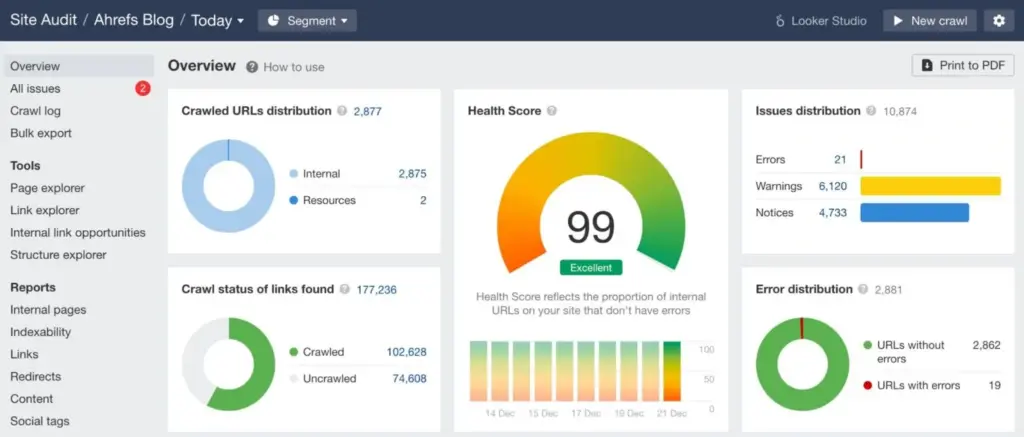In the competitive world of SEO, having the right tools can make a significant difference in your website’s ability to rank high on search engines. The top 11 SEO optimization tools offer a variety of features to help you analyze your website, understand your competition, and optimize your content for better performance. This guide provides an in-depth look at each tool, helping you choose which ones might be the best fit for your SEO needs.
1. Google Search Console
Google Search Console is a fundamental tool for any webmaster looking to get serious about SEO. It allows you to monitor, maintain, and troubleshoot your site's presence in Google Search results. You can understand how Google views your site and optimize its performance in search results.
System Requirements and Compatibility
- Requires a web browser and a Google account.
- Compatible with all major content management systems via site verification.
Pros
- Free to use.
- Direct insights from Google.
- Alerts for issues on your site.
Cons
- Can be complex for beginners.
- Limited in guiding on SEO strategy beyond basics.
Rating
⭐️⭐️⭐️⭐️ (4/5)
Learn more about Google Search Console
2. Ahrefs
Ahrefs is widely regarded as one of the most powerful tools in the SEO industry. It offers extensive capabilities in backlink analysis, keyword research, and competitive analysis. This tool is particularly valuable for SEO professionals looking to delve deep into their site's metrics and uncover opportunities.

System Requirements and Compatibility
- Web-based platform accessible from any modern browser.
- No specific hardware requirements needed.
Pros
- Comprehensive set of SEO features.
- Exceptional for backlink and competitor analysis.
- Regular data updates and new features.
Cons
- Higher price point.
- Can be overwhelming for SEO novices.
Rating
⭐️⭐️⭐️⭐️⭐️ (5/5)
3. SEMrush
SEMrush is another heavyweight in the SEO community, known for its depth in competitive analysis and keyword tracking. It offers a broad suite of tools, including content marketing and social media analysis, which makes it a go-to for marketers who manage multiple aspects of a website's online presence.
System Requirements and Compatibility
- Accessible via any web browser.
- Integrates well with other marketing tools and platforms.
Pros
- Extensive SEO, PPC, and social media features.
- Good for both small businesses and large enterprises.
- Strong content marketing toolkit.
Cons
- Can be pricey, especially for multiple user accounts.
- Some features may have a steep learning curve.
Rating
⭐️⭐️⭐️⭐️⭐️ (5/5)
4. Moz Pro
Moz Pro is known for its user-friendly interface and robust SEO toolset, including keyword research, link building, and site audits. It’s particularly favored by those new to SEO due to its extensive resource library and supportive community.
System Requirements and Compatibility
- Works on any system with an internet connection and a web browser.
- Compatible with various CMS and hosting platforms.
Pros
- Comprehensive SEO tools that are easy to use.
- Excellent educational resources for beginners.
- Strong community and customer support.
Cons
- Some users report data inaccuracies.
- Slower to update data compared to competitors.
Rating
⭐️⭐️⭐️⭐️ (4/5)
5. Yoast SEO
Yoast SEO is a top choice for WordPress site owners. It provides a straightforward way to manage the SEO fundamentals, like meta tags and content quality, directly from the WordPress dashboard.
System Requirements and Compatibility
- Exclusively for WordPress websites.
- Requires WordPress 5.2 or higher.
Pros
- User-friendly for beginners.
- Great for on-page SEO tasks.
- Regular updates and strong community.
Cons
- Limited to WordPress only.
- Premium features can be expensive.
Rating
⭐️⭐️⭐️⭐️ (4/5)
6. Screaming Frog SEO Spider
Screaming Frog SEO Spider is an extremely versatile tool that specializes in crawling websites to audit SEO issues. This desktop program is powerful for identifying broken links, analyzing meta data, and generating SEO audits.
System Requirements and Compatibility
- Available for Windows, macOS, and Ubuntu.
- Requires Java 8 or later to run.
Pros
- Deep crawl capabilities to detect technical issues.
- Useful for large sites.
- Frequent updates with new features.
Cons
- User interface is not the most intuitive.
- Free version has limitations on crawl depth.
Rating
⭐️⭐️⭐️⭐️⭐️ (5/5)
Learn more about Screaming Frog SEO Spider
7. SpyFu
SpyFu is a specialized tool that excels in competitor analysis and keyword research, allowing users to see most of the keywords their competitors have been ranked for and the ads they have run. It's particularly useful for those focused on competitive SEO and PPC tactics.
System Requirements and Compatibility
- Web-based service, compatible with any device that has internet access.
- No specific system requirements needed.
Pros
- In-depth competitor data for SEO and PPC.
- Unlimited search results and data exports.
- User-friendly interface and helpful customer support.
Cons
- Data may not be as extensive as some larger competitors.
- Primarily focused on the U.S. market.
Rating ⭐️⭐️⭐️⭐️ (4/5)
8. Majestic SEO
Majestic SEO offers one of the largest link intelligence databases, which is used to explore website backlinks. It's particularly valued for its data on the number and quality of backlinks, an essential factor in SEO.
System Requirements and Compatibility
- Internet access required; accessible through any web browser.
- No installation required, as it's a cloud-based tool.
Pros
- Extensive link analysis capabilities.
- Useful site comparison features for backlink analysis.
- Historical data available for long-term analysis.
Cons
- Can be complex for beginners.
- Focuses mainly on link data, with less emphasis on other SEO areas.
Rating ⭐️⭐️⭐️⭐️ (4/5)
9. KWFinder
KWFinder by Mangools is a keyword research tool that helps find long-tail keywords with low competition. Ideal for SEO experts and bloggers looking to rank in niche markets.
System Requirements and Compatibility
- Compatible with all major browsers on desktop and mobile devices.
- No specific hardware requirements.
Pros
- User-friendly interface ideal for beginners.
- Integrates with other Mangools tools for a complete SEO suite.
- Effective for finding niche keywords.
Cons
- Queries per day are limited on lower plans.
- Less robust than some other full-feature SEO tools.
Rating ⭐️⭐️⭐️⭐️ (4/5)
10. Ubersuggest
Created by Neil Patel, Ubersuggest is a budget-friendly SEO tool that offers keyword suggestions, SERP analysis, and SEO audit capabilities. It's suitable for small business owners and individuals just starting with SEO.
System Requirements and Compatibility
- Accessible on any device with an internet connection and a web browser.
- No specific hardware requirements.
Pros
- Affordable with a free tier available.
- Simple and intuitive interface.
- Offers basic tools necessary for beginner SEO tasks.
Cons
- Features are less comprehensive compared to other advanced tools.
- Reliability of data has been questioned by some users.
Rating ⭐️⭐️⭐️ (3/5)
11. BrightEdge
BrightEdge is an enterprise-level SEO and content performance marketing platform that uses artificial intelligence to provide SEO solutions. It's designed for large organizations looking to integrate SEO with their digital marketing efforts comprehensively.
System Requirements and Compatibility
- Requires an internet connection and a modern web browser.
- Tailored for enterprise use, with integration capabilities with various marketing platforms.
Pros
- Advanced AI capabilities for data insights.
- Comprehensive content and SEO management.
- Real-time tracking and recommendations.
Cons
- High cost makes it less accessible for small businesses.
- Can be complex to fully utilize without proper training.
Rating ⭐️⭐️⭐️⭐️ (4/5)
Overall View Of SEO Optimization Tools
These 11 top SEO tools are great for boosting a website's visibility online. Each tool is examined in detail, looking at features, pros, cons, and overall usability. From basic tools like Google Search Console to more advanced options like Ahrefs and SEMrush, there's something for everyone, whether you're just starting out or need sophisticated analytics. These tools help with everything from monitoring rankings to deep diving into competitive analysis, making them indispensable for effective SEO management.
FAQ
- What are SEO optimization tools and why are they important?
SEO optimization tools help analyze and improve a website’s visibility in search engine results. They are crucial for identifying areas of improvement, tracking performance, and strategizing SEO efforts effectively. - How does Google Search Console help improve SEO?
Google Search Console provides insights directly from Google, offering data on how the site appears in search results. It helps identify issues like crawl errors and provides data on website traffic, which is vital for SEO adjustments. - Can Ahrefs help identify competitor strategies?
Yes, Ahrefs is excellent for competitive analysis, offering tools to examine competitors' backlink strategies, keyword rankings, and SEO practices, which can help you adjust your strategy to gain a competitive edge. - What makes SEMrush different from other SEO tools?
SEMrush stands out by providing a broad range of functionalities that not only cover SEO but also include features for social media, content marketing, and PPC, making it a versatile tool for comprehensive digital marketing. - Is Moz Pro suitable for beginners in SEO?
Absolutely, Moz Pro is known for its user-friendly interface and a wide array of educational resources that are perfect for those just starting out in SEO. - What are the limitations of Yoast SEO?
While Yoast SEO is highly effective for on-page SEO tasks, it is only available for WordPress websites and some advanced features are locked behind a premium version. - How does Screaming Frog SEO Spider help with website audits?
Screaming Frog SEO Spider is great for crawling a website to identify SEO issues such as broken links, poor metadata, and redirect chains, providing a comprehensive audit that helps improve site architecture. - What is the main benefit of using SpyFu for SEO?
SpyFu focuses on competitor data, especially in PPC and SEO keywords, allowing users to uncover the keywords for which their competitors rank and the ads they have used, offering strategic insights to enhance their own SEO and PPC campaigns. - How does KWFinder assist in keyword research?
KWFinder helps find long-tail keywords with low competition, which is particularly useful for niche markets and can significantly improve the chances of ranking higher in search engine results. - Can i use seo optimization on landing pages?
Yes, you can and should use SEO optimization on landing pages. Optimizing your landing pages for SEO is crucial because it helps increase their visibility in search engine results, potentially driving more organic traffic to these pages. Check out the best landing page builders on our list. - Is BrightEdge suitable for small businesses?
BrightEdge is primarily tailored for larger organizations due to its complex features and higher cost. It offers enterprise-level SEO and content marketing features that might be excessive and expensive for smaller businesses.


